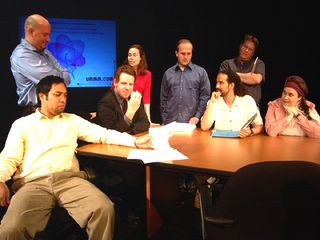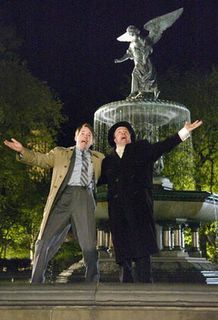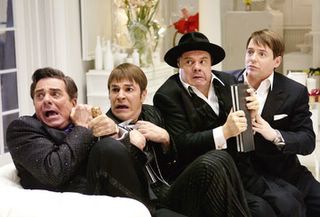From Reuters:
U.S. President George W. Bush told a German newspaper his best moment in more than five years in office was catching a big perch in his own lake.
"You know, I've experienced many great moments and it's hard to name the best," Bush told weekly Bild am Sonntag when asked about his high point since becoming president in January 2001.
"I would say the best moment of all was when I caught a 7.5 pound (3.402 kilos) perch in my lake," he told the newspaper in an interview published on Sunday.
It kind of makes you wonder why this man wanted to be President in the first place. He doesn't need the kind of unlimited power, access and authority granted only to those who climb to the highest levels of government to be happy. That's Dick Cheney, a man who won't lower himself to press a button, any button, unless it will trigger the massacre of at least 100,000 civilians.
But George Bush just needs some fishin' gear and a cooler full of PBR, and he's set. Can you imagine being that guy, a regular Jimmy Buffet stereotype, and being voted President. It would be hell on Earth. You're just hoping to organize your record collection, clear some brush and pass out watching a Bond film on TNT, and these people keep hassling you about trade negotiations with the Far East or news about which one of them is being investigated for fraud and/or manwhores.
Here's Tristero of Hullabaloo with his interpretation:
Quite possibly it's the pathetic whine of a deeply, perhaps clinically. depressed man who believes himself a total failure. Or maybe this is a man so uninterested in his job, let alone in serving his country, that he has no business whatsoever being president. Or perhaps this is simply an arrogant bastard who holds in utter contempt anyone who dares to ask him a question, so he responds with the stupidest thing he can say. (Obviously, nothing precludes all three or some combination of two.)
To be all pre-emptive about it, someone's bound to comment that maybe this just shows how much of a down-to-earth regular guy Bush is.
If you were going to posit that the quote was canned - that is, that some Bush advisor had thought they might ask him about his favorite Presidential memory, and coached him to give some folksy answer to please the NASCAR dads - I could see making the "regular guy" argument. He wants to seem like a regular guy, right? So he might answer something a regular guy might relate to, like catching a big fish, instead of something more elite and presidential, like meeting important Japanese officials and not vomiting on them like some other presidents I could mention.
But that's a pretty unlikely scenario. More likely, I think Bush is just a completely shallow idiot. Given this amazing opportunity - to represent America, to reach out to the people of the world, to change things for the better, to travel everywhere and experience life as it's being lived right now all around the world, to meet important people who are making a difference - he prefers to hang out and fish.
"Yeah, yeah, sure, freedom on the march, no child left behind...All that stuff...Just give me a second while I hook this worm. Dang things is squiggly."
Tristero points out a BBC article with more quotes from the German paper's Bush interview. This selection's a good deal more chilling:
In a more serious moment, he said he understood German opposition to the war in Iraq.
"The Germans today simply don't like war... And I can understand that.
"There is a generation of people whose lives were thrown into complete disarray by a horrible war."
The Germans today simply don't like war? What's implied in this statement. That the Americans don't mind war so much. Germans, oh, yeah, they hate it. War's just not for them. Beer, yes. Chocolate, hell yes. Meat? You better goddamn believe it. And they're significantly awesome filmmakers. But not so much about the war these days. Oh, sure, they're slipped up occasionally. Who hasn't accidentally started a few international conflicts/genocides?
But we Americans, we're just plain warlike. We dig it. It's what we're good at.
If you don't believe me, just check out this editorial from today's LA Times. Crime novelist Andrew Klavan thinks Hollywood should make more feel-good pro-military propaganda, like they did in the good old days of WWII! He's tired of thoughtful films that deal with America's place in the world in a nuanced, artistic manner. Klavan's hungry for a nice racist screed.
Check out the opening paragraph of his editorial, that made the front page of today's LA Times Calendar section.
THERE HAS NEVER been an age without war, not ever. Mass violence is a continual aspect of the human condition. Peace, like good weather, is always local and temporary — and what is peace anyway but the result of past victories in war and the effective threat of future war against would-be aggressors?
Hey, yeah! Take that, you dumbass anti-war protestors! There ain't even no such thing as peace anyway, hippies!
It's awful Orwellian, no? To see it spelled out plainly in a newspaper's Arts & Entertainment section like that. Peace is war. Klavan's all about that little taste of newspeak. Also, Ignorance is Knowledge.
We need some films celebrating the war against Islamo-fascism in Afghanistan and Iraq — and in Iran as well, if and when that becomes necessary. We need films like those that were made during World War II, films such as 1943's "Sahara" and "Action in the North Atlantic," or "The Fighting Seabees" and "Thirty Seconds Over Tokyo," which were released in 1944.
How does Andrew establish a connection between Bush's Excellent Iraqi Adventure and WWII? Kind of totally different in every way, man. In WWII, propaganda was easy. We were fighting a small group of countries that could be named. You want to make a 40's war film? Just write that American soldiers and shooting at (1) greasy Eye-Talians, (2) crazy suicidal Japs or (3) villainous yet highly disciplined Krauts. Done!
Our present conflict doesn't really lend itself as easily to propaganda. It's a movie about American soldiers and they go and...torture a bunch of possibly innocent, half-naked guys! American troops bond on the high seas before...accidentally gunning down worshippers on their way to a mosque! G.I.'s train a bunch of eager young Iraqi Army recruits, who wind up using their newfound weapons and knowledge to...ritualistically slaughter some of their neighbors who practice the wrong kind of Islam!
But I sense Klavan thinks any time the President wants to declare war somewhere, anywhere, Hollywood should back him up by brainwashing the masses. I mean, didn't you read the opening paragraph? We have to fight lots and lots of wars! So why won't Hollywood get on the bandwagon already?
I don't really feel that I need to point out that audiences are more savvy now than they were in the 40's, and the kind of straight-ahead, unnuanced propaganda that passed for entertainment then pretty much stopped working on consumers raised with televisions in their homes. I mean, I love a lot of those old war movies, but the sermonizing vascillates between being overbearingly ridiculous and creepy.
Not all of these were great films, or even good ones, but their patriotic tributes to our fighting forces inspired the nation.
More than that, they reminded the country what exactly it was that those forces were fighting to defend. Though many of these pictures now seem almost hilariously free with racist tirades against "sauerkrauts," and "eyeties" and "Tojo and his bug-eyed monkeys," they were also carefully constructed to display American life at its open-minded and inclusive best.
Every roll call of Hollywood's U.S. troops seems to include a Ragazzi and a Donovan, a Hellenopolis, a Novasky, and a wisecracking Roth. "Sahara" even throws in the black "Mohammedan" Tabul, a Sudanese ally. This may have been corny, but it was also more or less realistic, and it depicted the war as a conflict between our lovably mongrel melting pot and the despicable Axis ideal of racial purity.
Yikes...I love how Andrew states that these old war movies were virulently racist and that they displayed American life at its most inclusive in the same sentence. How does that work? Yeah, sure, they show the enemy as a group of Satanic faceless killers and condescend horribly to all the minority soldiers...but at least they got to be in the movie! We could have just made the whole thing will all Anglos, you know!
Honestly, I had an idea for the very thing Andrew's talking about a few years ago. You make a movie called Destination: Tikrit. It's a WWII-style "guys on a mission movie." Think Destination: Tokyo. Anyway, it's set during the present Iraq War but it's all made in the exact style of a 40's war movie - even in black and white.
You present a group of guys just like Klavan describes...A square-jawed captain, his no-nonsense executive officer and all the goofy soldier caricatures from those old movies. There's a horny one, a guy who misses his girl back home, a black guy, a shaky medic, a sharpshooter. You get where I'm going with this.
And they have to go scout around Tikrit for Saddam's bunker in 2003, the initial days of the war.
Sounds awesome, right? Right?
For all their epithets and stereotypes, then, these pictures sent the distinctly American message that it's not bloodlines but national creeds that make a people, and that while even so great a creed as ours can't guarantee the decency of individuals, evil creeds surely sweep them up into destructive madness and therefore must be opposed.
Unless you're a Mexican, in which case you should probably just get the hell out of here. The rest of us native Amurcans are united by a creed, okay, beaner!
Today we face an enemy in the grip of a belief system just as evil, just as destructive in its intent, as the system we fought back then. We were attacked at home in this war as we were in World War II. The outcome of the struggle is just as much in doubt. Worse, because Islamic fundamentalism supersedes nationhood, the danger it poses is more protean and diffuse. It's easier to pretend it isn't there, more tempting for the war-weary and the fatally foolish to waver and sound retreat. Don't you get it?
Andrew...stop, stop...You are embarrassing yourself. Clearly, this guy's suffering from Greatest Generation Envy. He wants the "Islamo-fascists" (what an idiotic phrase) to be the Nazis so so very badly, because apparently being an American has no meaning for him unless we're actively sing our military to save the world. It's not enough for us to just be an example to others, to work peacefully through problems with diplomacy, and to stop trying to dominate every other nation on the planet that might potentially have something we want. No, we have to go around killing everyone to prove that we're in charge, and if you don't like it, you're fatally foolish.
They are not Nazis. Not that hardcore Islamic fundamentalism is not a cruel, senseless and hate-filled ideology. It is. So is hardcore Christian fundamentalism. (Did I just blow your mind?) But not wanting to bomb innocent Iraqis, who had nothing to do with any terrorist attack on America, or make movies glorifying the bombing of innocent Iraqis doesn't make you "war weary" or weak or any of this other nonsense. It makes you sensible and fucking human.
In short, we need war movies now even more than in the '40s.
In a weird, twisted way, he's right. In the 1940's, the government had propaganda, but it didn't really need it as a way to convince men to enlist. Because men back then trusted their leaders. If the President went on the radio and said, "We are in grave danger and we need your help," men went to recruitment offices by the tens of thousands. It's actually kind of unbelievable. Do you think young men trust the government like that now? I wouldn't ask Donald Rumsfeld for the time of day for fear he'd just make up some bullshit. If I were a taxi driver and Douglas Feith got into my cab, after he told me his destination, I'd wait about 10 seconds and say, "Okay, now where do you really want me to take you?" All these guys do is lie and people are on to them, so they could really use a massive media machine like Hollywood to start helping them bullshit the masses.
But that doesn't mean it's a goddamn good idea!
So why aren't we getting them? One reason surely is that, in the years since World War II, our self-assurance as a nation, the self-assurance necessary for the waging of war, has been shaken, and Hollywood reflects that.
Wow...An actual sentence that rings true! It's a goddamn miracle.
The Western ethos, with its Christian roots, demands that we look to our own sins before judging the sins of others.
Except Mexicans and gays and Arabs and women who wants abortions and transsexuals and smokers and drug users and prostitutes and fat people and single mothers and black people and atheists. Fuck those guys. But if you aren't any of those things, we don't like to judge people.
Since the '60s, we have had, it seems, an endless string of war movies, from "Dr. Strangelove" to "Syriana," in which the United States is depicted as wildly aggressive and endlessly corrupt — which, in fact, it's not; which, in fact, it never has been.
Not sure I agree with his entire thesis here, but he's definitely misrepresenting these two films. Dr. Strangelove is about the absurdity of war, and it therefore makes both warring factions - Americans and Soviets - look aggressive and ridiculous. (I should note, however, that Strangelove, as a comedy, also includes a deep and abiding sympathy for the men who lead these incompetant militaries into a war. They seem befuddled and confused by the task at hand, not violent or angry or overly aggressive as Klavan implies.)
And Syriana doesn't lay blame solely on the United States, but seeks to analyze the entire oil industry in a much broader context. Individuals from a variety of nations are implicated, but really the conflicts in the Middle East spiral increasingly out of control without any additional help throughout the chaotic film.
In taking our self-examining ethos to these extremes, we have lost a kind of wisdom, wisdom that acknowledges the complexity of human life but can move through it to find the simple truth again.
This guy writes kind of like Jeff Goldstein, trying to obscure his puerile thesis with flowery language and excessive conditions and rejoinders. Andy wants to argue that Americans are a bunch of pussies who blame themselves for everything rather than focusing exclusively on hating their enemy. But he knows if he says that, it comes off as arrogant and hawkish and ignorant. So he dresses it up in nice clothes.
"It's great that we have complex art." "Sure, I recognize some old war movies were a bit racist!" "We're all just good Christians who blame ourselves too much for stuff!"
But the hostile, pathetic call to arms is there right below the surface. "Hey, folks, let's get down to simple truths! Killing foreigners saves American lives! Us or them! It's just that simple!"
Not only have we lost this kind of wisdom, but I think that a handful of elites — really only a handful of academics, journalists and artists — has raised up a golden counterfeit in its stead.
I've said it before, I'll say it again...Why does the LA Times run with this horseshit! As if Jonah Goldberg columns weren't painful enough.










